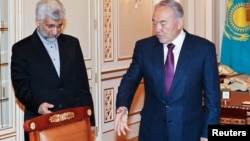U.S. analysts say Iran is trying to use international debate over its nuclear program for political leverage.
Alex Vatanka, a scholar at the Middle East Institute, said Iran has had plenty of opportunities to provide the International Atomic Energy Agency with the kind of assurances it wants to hear.
Speaking on VOA's Encounter program, he said Iran's reluctance to fully explain its nuclear enrichment efforts is all about politics. He said Tehran intends to use its nuclear program as an instrument for getting concessions from Western powers.
"You've got to ask yourself, why are they doing this, at this cost, for what purpose? It is not because it is needed for the generation of electricity. It is a political issue," said Vatanka.
Emanuele Ottolenghi is a senior fellow at the Foundation for the Defense of Democracies. He told Encounter there are clear signs that Iran's nuclear program has a political dimension.
"The Iranian regime has pursued what it says was a peaceful energy program to produce electricity for some 30 something years and yet, to this day, it has not produced not one single watt of electricity for its people," said Ottolenghi.
In a recent report, the International Atomic Energy Agency said Iran had begun installing advanced equipment at a uranium enrichment site.
If operated successfully, the equipment could speed up uranium enrichment to a level that Western powers fear could be used to produce an atomic weapon.
Vatanka said while Iran's leaders have been reluctant to bridge differences with the West, many of its citizens feel otherwise.
"There are, in my view, many people in Tehran who are looking and arguing the case for saying, "look, it is not just about the nuclear program. We have interests beyond that where we can work with the United States. Whether those voices will be heard or not, that is a whole different story."
Throughout, Iran has said its nuclear ambitions are peaceful.
Ottolenghi said for years, however, Iran has been stonewalling on whether there is a military dimension to its nuclear program during its negotiations with the five permanent members of the U.N. Security Council and Germany, the so-called P5+1.
"We have a long track record of Iran actually using negotiations to buy time, perhaps to try to cause divisions among the P5+1. Of course, Russia and China on the one hand; the United States and the Europeans on the other," he said.
During talks in London on Monday, U.S. Secretary of State John Kerry said Iran had a limited amount of time to negotiate in good faith.
"We have repeatedly made clear that the window for a diplomatic solution simply cannot by definition remain open forever," said Kerry.
Kerry said world powers are willing to negotiate in good faith, and he hoped Iran would make the right choice.
Alex Vatanka, a scholar at the Middle East Institute, said Iran has had plenty of opportunities to provide the International Atomic Energy Agency with the kind of assurances it wants to hear.
Speaking on VOA's Encounter program, he said Iran's reluctance to fully explain its nuclear enrichment efforts is all about politics. He said Tehran intends to use its nuclear program as an instrument for getting concessions from Western powers.
"You've got to ask yourself, why are they doing this, at this cost, for what purpose? It is not because it is needed for the generation of electricity. It is a political issue," said Vatanka.
Emanuele Ottolenghi is a senior fellow at the Foundation for the Defense of Democracies. He told Encounter there are clear signs that Iran's nuclear program has a political dimension.
"The Iranian regime has pursued what it says was a peaceful energy program to produce electricity for some 30 something years and yet, to this day, it has not produced not one single watt of electricity for its people," said Ottolenghi.
In a recent report, the International Atomic Energy Agency said Iran had begun installing advanced equipment at a uranium enrichment site.
If operated successfully, the equipment could speed up uranium enrichment to a level that Western powers fear could be used to produce an atomic weapon.
Vatanka said while Iran's leaders have been reluctant to bridge differences with the West, many of its citizens feel otherwise.
"There are, in my view, many people in Tehran who are looking and arguing the case for saying, "look, it is not just about the nuclear program. We have interests beyond that where we can work with the United States. Whether those voices will be heard or not, that is a whole different story."
Throughout, Iran has said its nuclear ambitions are peaceful.
Ottolenghi said for years, however, Iran has been stonewalling on whether there is a military dimension to its nuclear program during its negotiations with the five permanent members of the U.N. Security Council and Germany, the so-called P5+1.
"We have a long track record of Iran actually using negotiations to buy time, perhaps to try to cause divisions among the P5+1. Of course, Russia and China on the one hand; the United States and the Europeans on the other," he said.
During talks in London on Monday, U.S. Secretary of State John Kerry said Iran had a limited amount of time to negotiate in good faith.
"We have repeatedly made clear that the window for a diplomatic solution simply cannot by definition remain open forever," said Kerry.
Kerry said world powers are willing to negotiate in good faith, and he hoped Iran would make the right choice.




